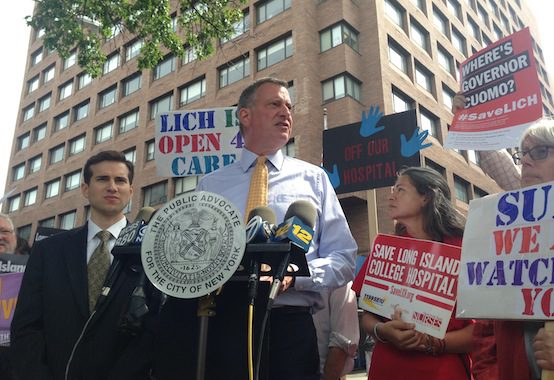No Left Turn in New York City

Bill de Blasio is mayor-elect of New York. According to many of de Blasio’s critics as well as his supporters, the unsurprising outcome of Tuesday’s election reflects a decisive turn in the city’s politics. The Nation claims that “Bill de Blasio’s exhilarating landslide victory over Joe Lhota in New York’s mayoral election offers a once-in-a-generation chance for progressives to take the reins of power in America’s largest—and most iconic—city.” In National Review, Kevin D. Williamson evokes John Carpenter’s b-movie classic, Escape from New York.
I say: not so fast. Neither turnout and polls nor de Blasio’s career so far support hope (or fears) that he’ll try to transform New York into Moscow on Hudson. Mayor de Blasio will not cultivate the the chummy relationship with Wall Street that Michael Bloomberg did. But there’s likely to be more continuity between their mayoralties than most people expect. In fact, that continuity is a bigger threat to the city’s future than the immediate collapse that some conservatives fear.
First, the election data. As Nicole Gelinas points out, de Blasio’s election was not the mandate for change that the margin of victory suggests.
Preliminary results show that about 1 million New Yorkers voted yesterday. That’s 13 percent lower than four years ago. Back then, remember, many voters disillusioned with the choices—Mayor Michael R. Bloomberg was running for a third term against the uninspiring Bill Thompson, Jr.—just stayed home. Turnout this year was as much as 30 percent below 12 years ago, when Bloomberg won his first victory. Voters supposedly so eager for change this year didn’t show that eagerness by voting. And a slim majority of the people who did vote—51 percent—told exit pollsters that they approve of Bloomberg, anyway. Though de Blasio’s victory margin was impressive, the scale of the win looks less stellar when put into recent historical context. As of early Wednesday, de Blasio had 752,605 votes—a hair shy of Bloomberg’s 753,089 votes in 2005.
So de Blasio did not win the votes of unprecedented number of New Yorkers. And many of those who did vote for him also supported Bloomberg. That doesn’t mean that they like everything Bloomberg did. But there’s no evidence here of a progressive tsunami.
What about de Blasio’s career? The tabloid press paid a great deal of attention to de Blasio’s visits to communist Nicaragua and the Soviet Union as a young man. More recently, however, de Blasio worked as a HUD staffer under Andrew Cuomo, and as campaign manager for Hillary Clinton. De Blasio took liberal positions during his tenure on the city council, particularly on symbolic issues involving gay rights. But this is not the resume of a professional radical.
It’s true that de Blasio made “a tale of two cities” the central theme of his campaign. As many observers have pointed out, however, he lacks the authority to enact his signature proposals: a tax increase on high earners, to be used to fund universal pre-K. Nothing’s impossible, but the chances of the state legislature approving such a tax hike are slim. The same goes for several of de Blasio’s other ideas, including a city-only minimum wage higher than the state’s minimum and the issuance of driver’s licenses to illegal immigrants.
The real issues under the de Blasio’s administration will be matters over which the mayor has some direct control. That means, above all, contracts with city workers, and policing. Will de Blasio blow the budget to satisfy public employee unions? And will he keep crime under control after eliminating stop-and-frisk ?
I’m cautiously optimistic about public safety. New Yorkers didn’t like living in fear, and de Blasio is smart enough to know that he’s finished if crime returns. Stop-and-frisk is not the only weapon in the NYPD’s arsenal.
The unions are a bigger problem. New York’s short-term fiscal outlook is reasonably good, so it’s hard to imagine de Blasio playing Scrooge to faithful supporters.
Even so, de Blasio’s mayoralty is unlikely to be a revolutionary moment. As Walter Russell Mead has argued, the biggest risk is that he pursues the same high-tax, high-regulation, high-service style of government on which Bloomberg relied. Those policies have helped transform much of New York into a gleaming shopping mall, which is admittedly a lot better than an urban jungle. But they are a bad strategy for prosperity in the years and decades to come.
Comments